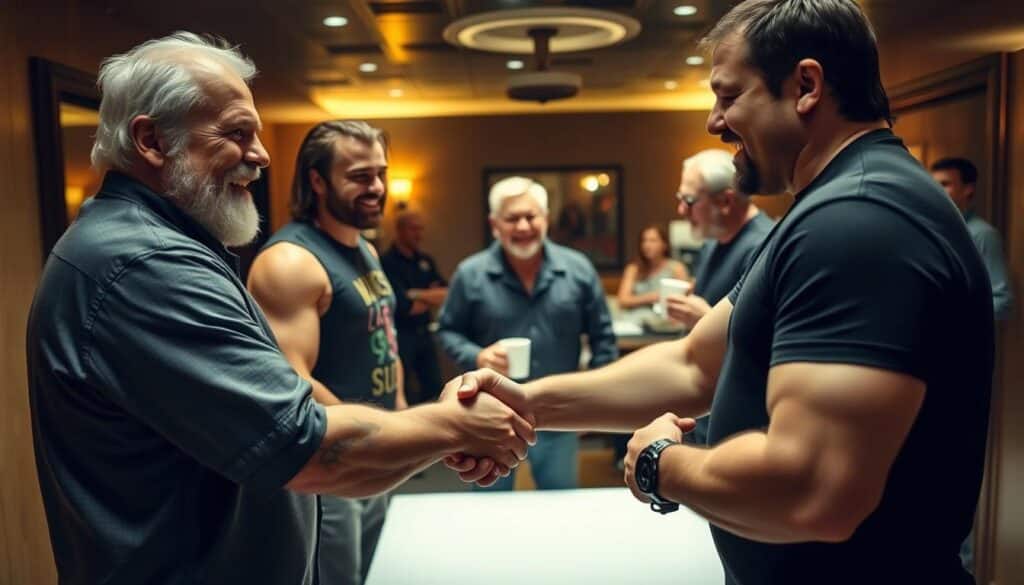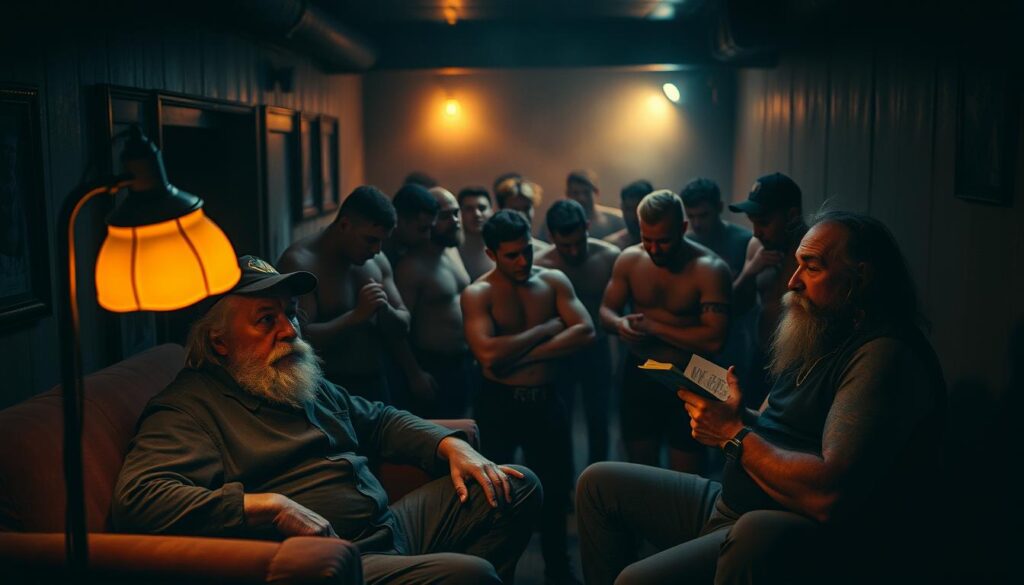Ever wonder if the wrestler who powerbombs grandmothers on TV actually recycles? Welcome to pro wrestling’s greatest magic trick. It makes you believe a teddy bear in flannel is a deranged sociopath. At the same time, the guy playing Captain Charisma backstage could out-grump Oscar the Grouch. Let’s rip open that curtain.
Mick Foley is a great example. The man who jumped off Hell in a Cell – literally – spent his downtime handing out Thanksgiving turkeys. It’s like he was a jolly, scarred Santa. On the other hand, some “fan favorites” have reportedly made arena janitors reconsider their career choices. It’s a plot twist: your favorite villain might be coaching T-ball, while Mr. Clean-Cut could’ve invented new curse words.
Why does this matter? Because wrestling’s real drama isn’t in the ring – it’s in the locker room tales that never make air. The industry thrives on contradictions sharper than a steel chair to the skull. You’ve got performers bleeding buckets for your entertainment… then quietly funding children’s hospitals between shows.
This isn’t just gossip. It’s about the schizophrenia of a business where your real-life persona becomes collateral damage for the character you play. That’s the essence of pro wrestler duality. How many “good guys” have secretly been locker room tyrants? Which snarling heels actually brought cookies for the crew? Strap in – we’re exposing the real-life face/heel dynamics that’ll make you question every scripted rivalry you’ve ever bought into.
How Locker Room Reputation Shapes Perception
Ever wonder why some wrestlers get ahead fast? Backstage politics are all about power, not moves. Fans see fake rivalries, but real battles happen in secret. Let’s uncover the truth (and maybe dodge a flying cigar).
Triple H’s “Reign of Terror” was a backstage chess game. He won on-screen battles, but lost in whispers. RVD and Booker T know the real pain of being “suplexed” out of the spotlight.
Sable’s diva acts were legendary. Coworkers even replaced her cigars with exploding ones. It was petty, but it worked. These stories are more than rumors—they’re survival guides.
Let’s look at the rules:
- Political capital > Championship gold: Steiner’s anger made WCW write stories around it
- Heat travels faster than a Stone Cold stunner: One bad move can keep you out for months
- Reputation is currency: Being easy to work with is more valuable than being a star
These backstage politics shape careers more than any promo. Being seen as a problem can end your career fast. Most fans don’t see what’s really happening.
So, when a star disappears, remember: they were likely fighting for their spot in the booking room.
Legends of Kindness
Ever wonder what happens when wrestling’s toughest stars trade steel chairs for real ones at charity dinners? Meet the Care Bear crew of the squared circle. They’ll surprise you with their kindness faster than you can say “Bah gawd, that’s Mr. Rogers’ music!”
Mick Foley: The Hardcore Saint
Mick Foley doesn’t count concussions; he tracks Make-A-Wish visits. He’s made over 500 wishes come true. This man, who literally fell off Hell in a Cell, is like Santa in a flannel shirt. Need life advice? Find him at a Waffle House. He’ll buy your hash browns and your worries.
Bayley: Hugonomics 101
Bayley is a wrestling paradox. She main-events WrestleMania and hugs fans like they’re her friends. Her arms should be insured as “hugging apparatus.” She’s a WWE Peacock documentary waiting to happen. When not hugging, she makes “approachable” a superpower.
Rey Mysterio: The Masked Sugar Daddy
Rey Mysterio’s real legacy is feeding new wrestlers. He’s the man behind the 619 and the “I’ll-get-the-check-619.” He once tipped a waiter with WrestleMania tickets. He’s putting over the next generation in a big way.
The Undertaker’s Secret Santa Clause
The Deadman did a Kris Kringle for WWE crew kids. Imagine 6’10” of darkness handing out My Little Pony dolls. It’s like Darth Vader volunteering at puppy shelters. “I’ll rest… in… holiday cheer… brother” is a new kind of wholesome.
Notorious for Rudeness
Some wrestlers are angels backstage, while others are bullies. Let’s explore the worst of the worst. Here, “worst wrestling gimmicks” meet real-life mean-spiritedness, no script needed.
The Iron Sheik: Diplomacy’s Worst Enemy
The Iron Sheik would’ve been kicked out of backstage etiquette Olympics. His shoot interviews are WWE horror stories. He threatened Hulk Hogan’s family and turned locker rooms into chaos. Stay away from camel clutches and airport talk with him.
Ultimate Warrior: Make-A-Wish? More Like Make-A-Snub
The Ultimate Warrior was a war crime in face paint. He refused to visit dying kids, saying he was “too busy.” His gimmick was a disaster, not just failed.
| Wrestler | On-Screen Persona | Real-Life Behavior | Gimmick Fail Score |
|---|---|---|---|
| The Iron Sheik | Foreign Heel | Unfiltered Rage Machine | 9/10 |
| Ultimate Warrior | Colorful Superhero | Charity Dodger | 8.5/10 |
| Buff Bagwell | Pretty Boy | Mommy’s Sick Day Specialist | 7/10 |
| Jeff Hardy (TNA Era) | High-Flyer | Pharmaceutical Test Pilot | 10/10 |
Special Mention: The Buff Bagwell School of Accountability
When your mom calls promoters saying you’re “sick” at 35, you’re a legend. Bagwell made being a baby an art form. His gimmick was bad and hereditary.
These wrestlers didn’t just break kayfabe; they shattered it with a steel chair. Their antics are more exciting than WWE’s today. We love the drama.
Interviews, Anecdotes, and Peer Reports
Wrestling’s wildest moments often happen backstage, not in the ring. Imagine Ric Flair’s “WOOOO!” ringing out in a hotel at 2AM. These wrestling backstage stories are real, not scripted. They’re like bonus levels after a long match.
Rick Rude’s “crotch-gate” in 1993 is a classic. He wore tights with Kathie Lee Gifford’s face on them. When asked to change, he said it was a tribute to her talent. It was both absurd and brilliant.
Ric Flair’s life is like a WWE 24/7 Championship defense. He once had a party so loud, police came. Flair was found champagne-soaked, yelling “LIMOOOOO!” at a car. He said he was just practicing his promos.
- Sean Waltman’s “brown surprise” prank
- Road Warrior Animal’s rotisserie chicken food fight
- Undertaker’s “coffin naps” between matches
These stories show the difference between real life and on-screen wrestling. Wrestlers who craft their in-ring personas will also play pranks. It’s like Batman binge-watching cat videos.
Shoot interviews reveal the truth about wrestling. They tell stories like Macho Man trying to park a tour bus. As one road agent said, their HR is like a trauma center with folding chairs.
Impact on Careers and Fans
Backstage politics in wrestling is like Mario Kart. One bad move can ruin years of work. Whether you’re new or experienced, your reputation matters. It affects your booking, sponsorships, and fan support.
The Spreadsheet of Suffering
John Cena’s “Never Give Up” gear sells well because fans believe in him. On the other hand, Lex Luger’s refusal to lose hurt his career and others. This shows how important being liked is, not just in wrestling but in business too.
Sable’s diva act cost WWE a lot in lost endorsements. This shows that being popular isn’t always good for business.
| Wrestler | Backstage Move | Career Impact | Fan Reaction |
|---|---|---|---|
| Lex Luger | Refused to lose matches | Buried 5+ future main-eventers | 70% drop in merchandise relevance |
| Bayley | Maintained “hugger” persona | 3x merch sales vs. scripted counterparts | #1 in kid-friendly fan polls |
| The Iron Sheik | Publicly trashed rivals | Banned from 2000s WWE events | Cult following (but zero brand deals) |
New Gen, New Rules
Today’s wrestlers in AEW and NXT study history. They know one bad move can end their push. Indie stars like Orange Cassidy show how to be real and marketable.
In today’s world, your image must be real or entertaining. TikTok makes drama public fast. So, your wrestler gimmicks and characters must be believable or fun.
Ethics: Image vs. Reality
Ever wonder why Ultimate Warrior spent his final years apologizing for decades of homophobic rants? WWE airbrushed his legacy into family-friendly merch. Wrestling’s moral tightrope wobbles harder than a ladder match spot—do we cheer the art if the artist’s real-life persona smells worse than The Iron Sheik’s gym bag? The industry’s PG-era glow-ups can’t scrub away backstage tales of JBL’s shower antics or Melina’s locker-room cold wars.
Rick Rude’s crotch-chopping theatrics might’ve killed in 1989, but today they’d trend faster than Enzo Amore’s backstage exile. Legendary wrestlers and their impact hinge on this paradox: we crave villains who make us boo, not bullies who make coworkers dread payday. Daniel Bryan’s organic rise versus Randy Orton’s “vanilla midget” gripes proves wrestler reputation isn’t just scripted—it’s earned when cameras stop rolling.
Should we care if our heroes are heels? WWE’s revisionist history (looking at you, Warrior “documentaries”) clashes with Twitter’s backstage exposés. Kayfabe’s corpse twitches every time Bayley’s genuine kindness upstages her “Role Model” gimmick. The real Royal Rumble? Navigating fandom’s moral compass when your favorite suplex machine might’ve spiked someone’s drink—or career—for laughs.


